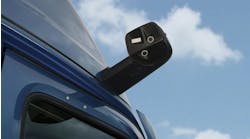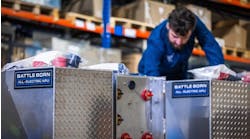All too often fleets look at the cleaning of their trucks as an expense. And while it does cost money to keep a truck clean, the benefits far outweigh the cost.
The subject of vehicle washing is so important that the Technology & Maintenance Council has an entire Recommended Practice (RP433) devoted to it. If you haven’t already done so, you may want to read it.
Perhaps the most important reason to keep your truck clean is that you actually extend its road life. It’s no secret that the de-icing chemicals used on today’s roads are extremely corrosive. The longer they remain on the undercarriage of your trucks the more damage they do.
Keeping trucks clean is especially important if they operate in areas that use the new, stronger chemicals. But whether you wash your trucks yourself, or send them to a truck wash, it is important to remember that water can re-activate the de-icing chemicals that have dried on the truck. It is critical that whoever is doing the washing be mindful of the direction they wash so that the chemicals are not pushed deeper into the components where they can cause more problems.
If your trucks never venture into winter conditions, consider yourself lucky, but don’t use that as an excuse to avoid washing them. General dirt, debris and grime from the road attaches to components and can interfere with their proper operation.
A clean truck also makes it easier for drivers and technicians to notice things like chaffing lines, electrical problems, cracks and damage to components. If components, parts, systems and sub-systems are covered in a layer of dirt or grit, problems are much harder to spot.
CSA (Compliance, Safety, Accountability) inspectors have their choice about which vehicles to pull over for a roadside inspection. The vehicle’s appearance can mean the difference between your driver being pulled over or not. Whether it is right or wrong, an inspector assumes that a truck that looks shoddy on the outside is less likely to be maintained properly.
While there is no guarantee you won’t ever get pulled over if your truck is clean, I can say with certainty that a filthy truck is a red flag for inspectors.
Then there is the image piece both for attracting drivers and for new customers. The driver shortage means good qualified drivers have a choice of where to work. Given a choice between a fleet with shiny clean trucks and one whose trucks are covered in dirt and grime, which one do you think they’ll choose?
And drivers are not the only people you are trying to impress. Your truck is a rolling billboard, advertising for your business. Ask yourself what message you send when people see your truck covered the road grime. Shippers see carriers as extensions of themselves and do not want to be represented by someone who presents a poor image.
Truck washing it not free but the benefits are priceless: components live longer, it makes it easier to spot problems in their initial stages, drivers are happier, your image is enhanced, and your chances of being pulled over lessen with each passing mile.


